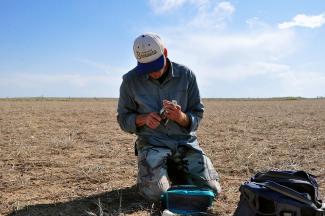The Department would like to congratulate Tyler on his successful defense of his Masters Thesis. Job well done!
Tyler Michels
Masters Candidate in Dr. Michael Wunder's Lab
CU Denver Dept. of Integrative Biology
The mountain plover (Charadrius montanus) is a migratory shorebird that breeds in rangelands of the western Great Plains. Populations have declined sharply since the 1960s and the species is of conservation concern in most states and provinces where it occurs. Nesting behavior involves an unusual split-clutch mating system; females typically lay 3 eggs in a nest tended entirely by the male, before laying another 3 eggs in a different nest for the female. Mated birds do not provision each other during the incubation and brood-rearing periods (~29 and ~35 days, respectively). Because of this, nesting habitat must also provide efficient foraging for incubating adults. Plovers are known to have nested on fallow cultivated fields since the 1980s, but little information exists about adult plover behavior and habitat use during the incubation period on croplands. To determine how incubating plover use habitat in a mixed habitat and ownership landscape, I deployed and recovered 13 miniature global positioning system (GPS) dataloggers on adult plovers incubating nests on cultivated fields in Weld County, Colorado, USA. I estimated home-range size while foraging using 95% kernel density contours and report a median of 56.8 ha (range 3.7-350.7) Plovers were found to be on the nest more during mid-day hours (11:00-16:00) and off the nest during early-morning (5:00-8:00) and late-evening hours (17:00-21:00). I recorded the proportion of foraging locations per habitat type throughout the deployment period and found plovers foraged the most on cropland. Grassland habitat was used disproportionally less than its availability, whereas cropland and prairie dog colonies were used proportional to its availability. State/public and privately owned land were both used proportional to its availability. These data will help understand how landscape level habitat fragmentation brought about by changes in farming economics, energy development, and/or climate may impact mountain plover breeding biology.
Everyone is invited to attend. Zoom https://ucdenver.zoom.us/j/385674455 ; Meeting ID: 385-674-455

